Replace Sway Bar Links
Because they wear very slowly, most car owners don't realize how bad their sway bar link bushings are until they begin to hear noises. In some cases, they're missing entirely! Fortunately, they are inexpensive to buy and relatively simple to replace.
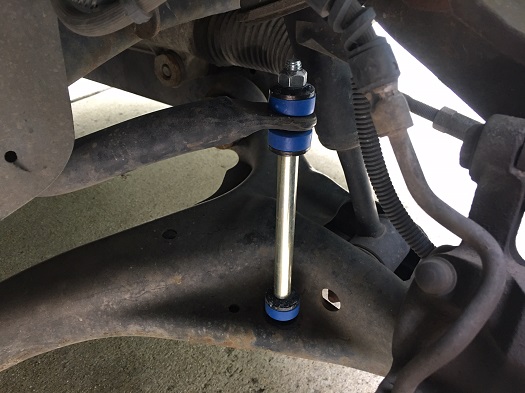
Aside from wearing out with time, the link bushings can be damaged if they get soaked by engine oil or another fluid leak. If this has happened, the leak should be repaired before replacing. If not, the new bushings will quickly fail.
What Does A Sway Bar Do?
You've probably noticed that when you steer hard into a turn, the body of the car wants to roll the other way. For example, when making a right turn, the car body rolls to the left.
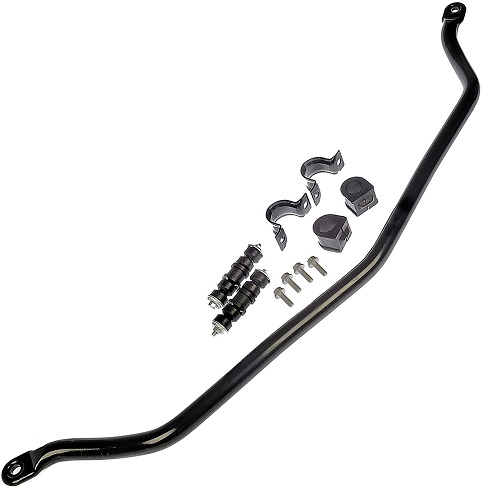
To prevent this from happening, automotive manufacturers install sway bars (also called stabilizer bars or anti-roll bars), that connect the left and right sides of the front suspension. Their function is to reduce body roll. They are sometimes installed on the rear suspension as well.
******************
NOTE: When ordering replacement parts, specify sway bar link kit or sway bar link bushings.
******************
Sway Bar Links vs Bushings
Rubber bushings hold the sway bar onto the frame, the links are on either end. When driving straight down a road, the sway bar just rotates up and down in the bushings. These don't wear out as quickly as the outer links do.
Getting Started
If you're working from the ground, position a floor jack at the proper factory lift points, then place jack stands as close to the jack as possible. About a foot off the ground should be enough room to work.
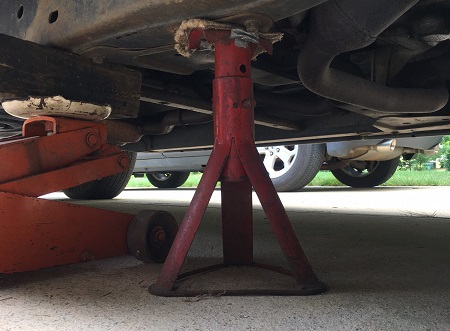
Removing Old Sway Bar Links
Working on old cars means dealing with stuck nuts and bolts. The first time I replaced stabilizer links was many years ago, before the advent of Youtube and the Internet. Not knowing any better, I tried to remove the old links with a ratchet and a wrench. This proved to be a waste of time.
I soon learned that most repair shops quickly remove them with an air-powered cut-off wheel.
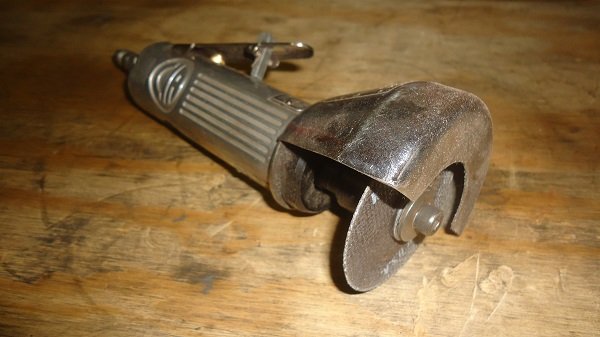
While cutting, slowly slice the link with the cut-off wheel, letting the tool do the work. Do not force it to cut faster, as that will overheat the tool and the metal.
Also effective is an electric angle grinder with a cutting disc. A hacksaw will also work, but will take more time and effort.
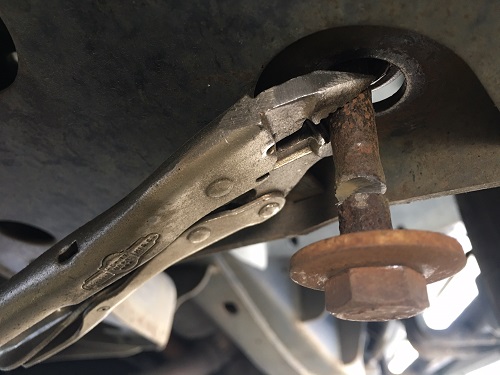
TIP: If you have the clearance, a vice-grip locked onto the link will keep it from spinning while you're cutting it off.
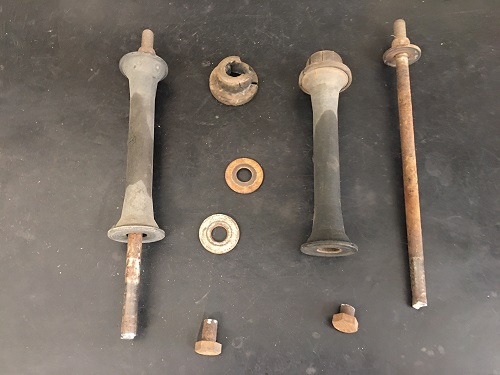
******************
Replacement Parts
A replacement kit generally includes new bushings, washers, links (long threaded studs), and nuts. Quite often, they'll be variations or upgrades from the original ones.
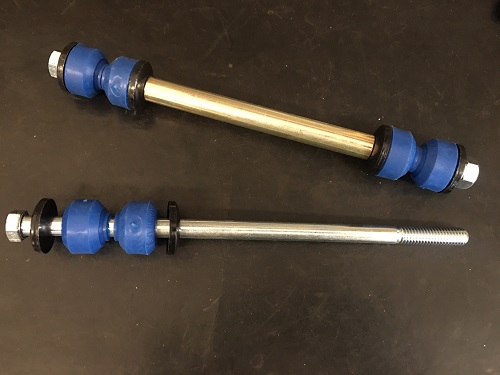
Rubber vs Polyurethane
Polyurethane bushings are an upgrade over original rubber type, and are often included with premium brands. They will last longer than rubber ones.
******************
Top Nut Won't Thread On
Sometimes you can't compress the link bushings quite enough to thread the top nut on. If this happens, take a 2x4 block of wood and wedge it between the ground and the bottom of the link.
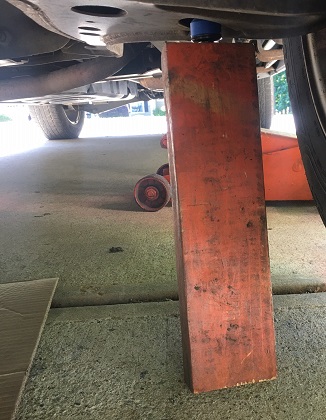
This should give you that little bit more of thread you need to install the top rubber, washers, and nut.
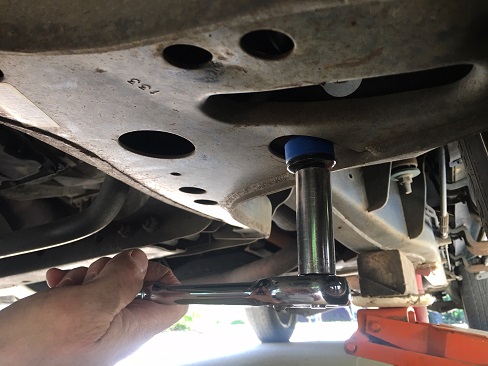
Once threaded on, the links can be tightened with a hand ratchet and wrench.
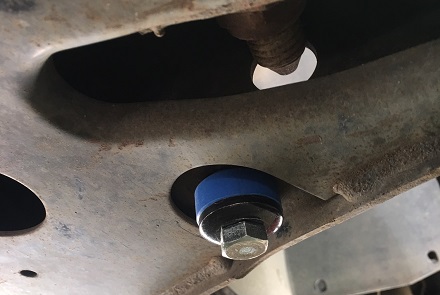
Don't Over-Tighten
Manufacturers recommend tightening the assembly until the bushing starts to bulge, then loosen 1/4 turn.
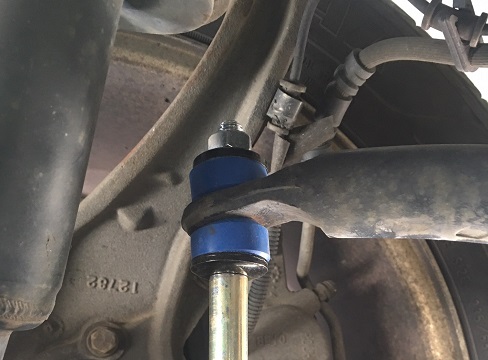
Don't over-tighten. You just want to tighten until the rubber bulges.
Tools Needed
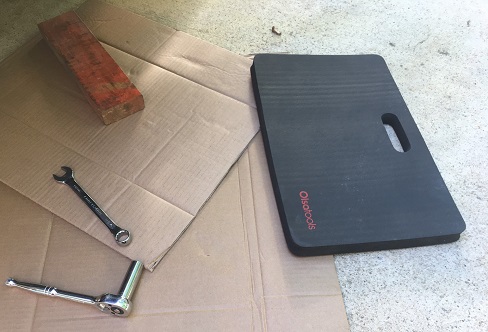
Ratchet and socket, a wrench or two, work pad, and maybe a block of wood.
******************
Can You Replace Just One Sway Bar Link?
Yes you can, but they're relatively cheap, so why not replace the other one, as they generally wear out at the same time. So, although recommended to replace in pairs, one side may be changed without any difference in ride quality.
Notes and Misc
When working under a car or truck, wear gloves and safety glasses.
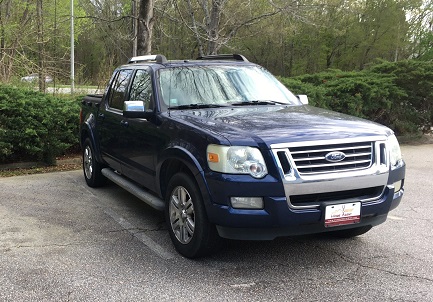
The vehicle in this article was a 2008 Ford Sport-Trac.
********************
Related Articles: